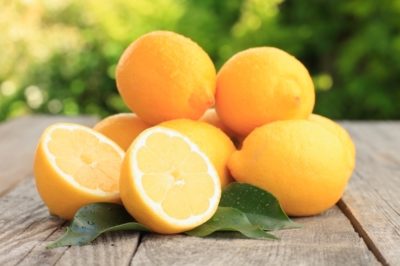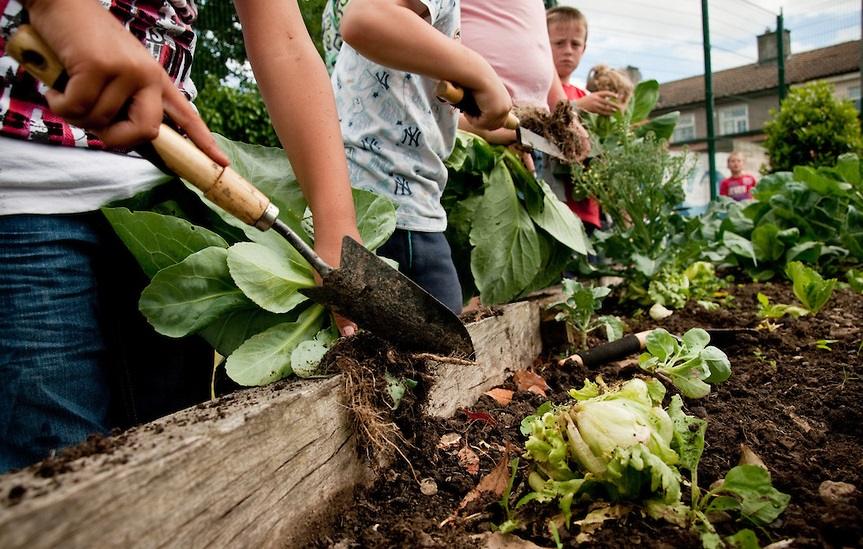 The fresh, clean smell of lemon is something that we enjoy in everything from our furniture polish to our shampoo. In addition to making refreshing lemonade in the summertime, we enjoy squirting lemon juice into our iced tea and into our drinking water for its tangy flavor.
The fresh, clean smell of lemon is something that we enjoy in everything from our furniture polish to our shampoo. In addition to making refreshing lemonade in the summertime, we enjoy squirting lemon juice into our iced tea and into our drinking water for its tangy flavor.
The lemon, which grows on a fragrant evergreen tree, is thought to have originated in the Indus Valley. In addition to using the fruit for ornamental purposes, Ancient Egyptians felt that eating lemon or drinking its juice offered protection against poisons. Arabs introduced the lemon to Spain, and, by 1150, the fruit was widely cultivated in the Mediterranean region.
Christopher Columbus brought lemon seeds to the New World in 1493, and as Europeans moved throughout the continent of North America, they brought lemon seeds with them. Today most of America’s lemons are grown in California or Arizona.
The medicinal benefits of lemons have been known for centuries. Containing vitamin C, citric acid, potassium, calcium, flavonoids, B-complex vitamins, copper, iron, phosphorus, magnesium and fiber, lemons pack quite a nutritional punch. But the sunny little fruit has a myriad of other uses, as well. Here are 15 of them you might not expect:
1. Treats skin blemishes
Applied directly to an affected area with a cotton ball, a little fresh lemon juice acts as an astringent, eliminating oil and tightening facial pores. Leave a small amount of juice on your blackhead or pimple overnight and then rinse well in the morning. Lemon juice also is effective in treating rough parts of the skin such as elbows.
2. Relieves canker sores
Lemons contain antibacterial properties that can help the healing process of painful canker sores in the mouth. Rinse your mouth with a solution of freshly squeezed lemon juice and lukewarm water three times a day.
150 Super-Easy Herbal Formulas for Green Cleaning…
At first, you may experience a burning sensation when the juice comes into contact with the canker sore, but the feeling will diminish with repeated use.
3. Boosts immunity to fight colds
At the first sign of a cold, help your body fight off the germs with the high vitamin C of lemons. Try drinking the freshly squeezed juice of a lemon mixed into a glass of lukewarm water every few hours. Gargling with a lemon-water rinse is also helpful for a sore throat. Adding a spoonful of lemon juice to your favorite tea is another great way to soothe your throat.
4. Fights bad breath
Chewing on a lemon slice after a meal can help keep your breath fresh. The citric acid helps to balance the pH level in your mouth and helps to kill bacteria that causes mouth odor. Be sure to rinse your mouth thoroughly after a few minutes, though, because long-term exposure to the acid in lemons could harm the enamel on your teeth.
6. Brightens dull laundry
Use lemon juice as a natural and safer alternative to bleach in your laundry. Add about a quarter cup of juice to the washing machine to brighten your white clothing items.
7. Repels insects.
Most bugs just do not like the smell of lemons. Mix about 20 drops of lemon juice into one cup of water in a clean spray bottle and then spray the solution into the air near your outdoor activity. Another option is to rub lemon peel directly on exposed skin to keep insects at bay. Try spraying lemon juice along your baseboards or windowsills to keep insects from getting into your house.
8. Neutralizes odors
Use a cut lemon or fresh-squeezed lemon juice to remove unwanted odor from your cutting board, your microwave interior or other kitchen surfaces. You can also add it to the cooking water when you prepare certain smelly foods such as cabbage to eliminate smells.
Story continues below video
9. Relieves stomach distress
If your indigestion is caused by a lack of stomach acid – rather than too much of it — drinking the juice of one lemon mixed in a glass in warm water after a meal can provide relief. The lemon juice naturally stimulates the production of stomach acid.
10. Cleans glass
Dab straight lemon juice onto a piece of newspaper to remove tough spots on your windows. For larger areas, spray a lemon juice-water solution onto the glass and wipe clean with a soft cloth.
11. Removes stains
Make a paste of lemon juice and salt to remove stubborn stains – such as mildew, grape juice or olive oil — from durable fabrics. Rub the paste into the stain, and then launder. If unsure of color fastness, test an unseen area first.
12. Prevents foods from turning brown
Potatoes and cauliflower can turn brown when you boil them. Keep them appetizing looking by squeezing a teaspoon of lemon juice into the cooking water. By the same token, you can keep your freshly made guacamole looking green by sprinkling lemon juice on it. Try adding lemon juice on your apple or pear slices, too!
13. Unsticks rice
Keep your rice from becoming a gloppy mess by adding a teaspoon of lemon juice to the boiling water just before you add the rice. Not only will your rice be fluffy, but clean-up will be easier too.
14. Freshens dishwasher and disposal
Put used lemon peel down your garbage disposal to keep it smelling fresh, and try putting half a lemon through one of your upright dishwasher tines before you run your machine. The lemon’s acid will help rinse your glasses and will help keep the dishwasher smelling fresh.
15. Cleans tarnished metal
Rub the cut side of a lemon half on your stainless steel flatware and stainless steel sink. Try it on your sink faucet and handles, too. Allow the juice to work for a few minutes, and then rinse with water and dry with a soft cloth.
Now that you have some new uses for lemons, here are some tips for choosing the best ones at your produce section.
- Lemons should be a vibrant yellow color. Green tinges indicate that they have not yet fully ripened.
- Over-ripe lemons look wrinkled and are less vibrant in color. They may have soft patches, as well.
- Juicy lemons will have peels with finely grained texture. Generally the heavier the lemon, the juicier the lemon.
- Lemons will stay fresh for about a week to 10 days at room temperature, or you can store them in the refrigerator for four to five weeks.
- Always wash the outside of the lemon before putting the peel in your drinking water or other beverage.
Sign up for Off The Grid News’ weekly email and stay informed about the issues important to you











